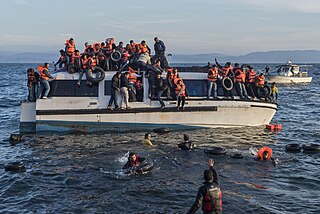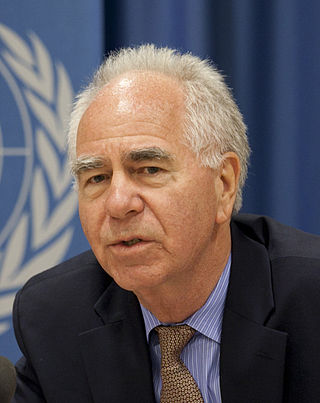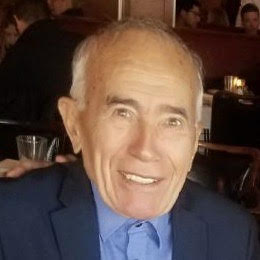Related Research Articles

The International Organization for Migration (IOM) is a United Nations related organization working in the field of migration. The organization implements operational assistance programmes for migrants, including internally displaced persons, refugees, and migrant workers.

Infant formula, also called baby formula, simply formula, baby milk or infant milk, is designed and marketed for feeding to babies and infants under 12 months of age, usually prepared for bottle-feeding or cup-feeding from powder or liquid. The U.S. Federal Food, Drug, and Cosmetic Act (FFDCA) defines infant formula as "a food which purports to be or is represented for special dietary use solely as a food for infants by reason of its simulation of human milk or its suitability as a complete or partial substitute for human milk".

Forced displacement is an involuntary or coerced movement of a person or people away from their home or home region. The UNHCR defines 'forced displacement' as follows: displaced "as a result of persecution, conflict, generalized violence or human rights violations".
A boycott was launched in the United States on July 4, 1977, against the Swiss-based multinational food and drink processing corporation Nestlé. The boycott expanded into Europe in the early 1980s and was prompted by concerns about Nestlé's aggressive marketing of infant formulas, particularly in underdeveloped countries. The boycott has been cancelled and renewed because of the business practices of Nestlé and other substitute manufacturers monitored by the International Baby Food Action Network (IBFAN). Organizers of the boycott as well as public health researchers and experts consider breast milk to be the best nutrition source for infants. The World Health Organization (WHO) recommends infants to be exclusively breastfed for the first six months of their lives, nevertheless, sometimes nutritional gaps need to be filled if breastfeeding is not possible.
The International Baby Food Action Network, IBFAN, consists of public interest groups working around the world to reduce infant and young child morbidity and mortality. IBFAN aims to improve the health and well-being of babies and young children, their mothers and their families through the protection, promotion and support of breastfeeding and optimal infant feeding practices. IBFAN works for universal and full implementation of the International Code of Marketing of Breast-milk Substitutes and Resolutions.
The International Code of Marketing of Breast-milk Substitutes is an international health policy framework for breastfeeding promotion adopted by the World Health Assembly (WHA) of the World Health Organization (WHO) in 1981. The Code was developed as a global public health strategy and recommends restrictions on the marketing of breast milk substitutes, such as infant formula, to ensure that mothers are not discouraged from breastfeeding and that substitutes are used safely if needed. The Code also covers ethical considerations and regulations for the marketing of feeding bottles and teats. A number of subsequent WHA resolutions have further clarified or extended certain provisions of the Code.
Derrick B. Jelliffe and his wife Eleanore. F. Patrice Jelliffe – known as Dick and Pat Jelliffe – were experts in tropical paediatrics and infant nutrition. They are most known for their seminal book, Human Milk in the Modern World, published by Oxford University Press in 1978, and for editing the multi-volume Advances in International Maternal and Child Health. The Jelliffes also wrote over 500 scholarly papers, often together, and 22 books. They lived and worked in England, Africa, India, the Caribbean and settled in Los Angeles, where he held the Chair in Public Health and Paediatrics at the University of California from 1972 to 1990.
The World Alliance for Breastfeeding Action (WABA) is a network of people working on a global scale to eliminate obstacles to breastfeeding and to act on the Innocenti Declaration. The groups within this alliance tackle the problems from a variety of perspectives or point of views, such as consumer advocates, mothers, and lactation consultants.

The Ministry of Health and Family Welfare, also known by its abbreviation MoHFW, is an Indian government ministry charged with health policy in India. It is also responsible for all government programs relating to family planning in India.

The history and culture of breastfeeding traces the changing social, medical and legal attitudes to breastfeeding, the act of feeding a child breast milk directly from breast to mouth. Breastfeeding may be performed by the infant's mother or by a surrogate, typically called a wet nurse.

Breastfeeding difficulties refers to problems that arise from breastfeeding, the feeding of an infant or young child with milk from a woman's breasts. Although babies have a sucking reflex that enables them to suck and swallow milk, and human breast milk is usually the best source of nourishment for human infants, there are circumstances under which breastfeeding can be problematic, or even in rare instances, contraindicated.
The International Centre for Migration, Health and Development (ICMHD) is a Swiss-based non-profit organization based in Geneva, Switzerland. It is a research, training and policy centre founded in 1995 with the purpose of improving, protecting and advocating for the health and welfare of people on the move. ICMHD is a WHO Collaborating Centre for Health-Related Issues Among People Displaced by Disasters and a UNFPA Implementing Partner. It also works with other UN agencies as well as with universities and research and training institutions throughout the world.

Breastfeeding, also known as nursing, is the process where breast milk is fed to a child. Breast milk may be from the breast, or may be pumped and fed to the infant. The World Health Organization (WHO) recommend that breastfeeding begin within the first hour of a baby's birth and continue as the baby wants. Health organizations, including the WHO, recommend breastfeeding exclusively for six months. This means that no other foods or drinks, other than vitamin D, are typically given. The WHO recommends exclusive breastfeeding for the first 6 months of life, followed by continued breastfeeding with appropriate complementary foods for up to 2 years and beyond. Of the 135 million babies born every year, only 42% are breastfed within the first hour of life, only 38% of mothers practice exclusive breastfeeding during the first six months, and 58% of mothers continue breastfeeding up to the age of two years and beyond.

Dr. Neil Boothby is a psychologist and former US Government special advisor and senior coordinator to the USAID administrator on Children in Adversity, and former director of the Program on Forced Migration and Health at the Columbia University Mailman School of Public Health. Currently, he is the founding Director of the Global Center for the Development of the Whole Child at the University of Notre Dame. His research focuses on the psychosocial consequences of organized violence on children. As a senior representative of UNICEF, UNHCR, and Save the Children, he has worked for more than 25 years with children in crises in Africa, Asia, Latin America, and Eastern Europe and is an internationally recognized expert and advocate for children affected by war and displacement. He has received numerous awards for his work on behalf of war-affected children, including the Red Cross International Humanitarian of the Year Award, the Mickey Leland Award, the United Nation's Golden Achievement Award for Social Services, and Duke University's Humanitarian Service Award.
Allan Rosenfield was an advocate for women's health during the worldwide AIDS pandemic as dean of the Columbia Mailman School of Public Health.

Wafaa El-Sadr is a Columbia University Professor and the director of ICAP at Columbia University, Columbia World Projects and the Center for Infectious Disease Epidemiologic Research (CIDER) at Columbia Mailman School of Public Health.
Infant feeding is the practice of feeding infants. Breast milk provides the best nutrition when compared to infant formula. Infants are usually introduced to solid foods at around four to six months of age.

Quarraisha Abdool Karim is an infectious diseases epidemiologist and co-founder and Associate Scientific Director of CAPRISA. She is a Professor in Clinical Epidemiology, Columbia University, New York and Pro-Vice Chancellor for African Health, University of KwaZulu-Natal, South Africa.
Karithi Ruth Wanjiru Nduati is a Kenyan Pediatrician and Epidemiologist who also teaches at the University of Nairobi College of Health Sciences. She is also currently leading an interdisciplinary program through the University of Nairobi School of Medicine to educate physician-researchers to best implement HIV treatment and prevention methods backed by research. The program was funded by the Fogarty Training Grant which is a part of the PEPFAR funds the country of Kenya received.

Arif Smajkić is a leader and founder of public health in Bosnia and Herzegovina, educator, researcher, and scientist who worked on multiple projects related to health and medicine.
References
- ↑ "PERSONAL AND COMMUNITY RECONSTRUCTION, RESILIENCE, AND EMPOWERMENT IN TIMES OF ETHNOPOLITICAL CONFLICT" (PDF). Archived from the original (PDF) on July 18, 2010.